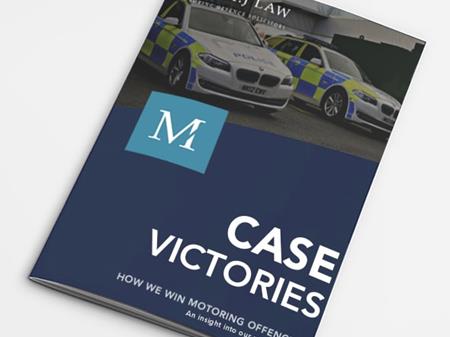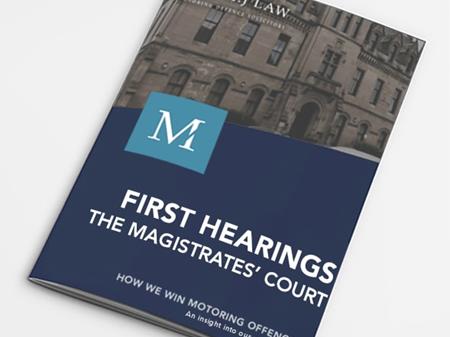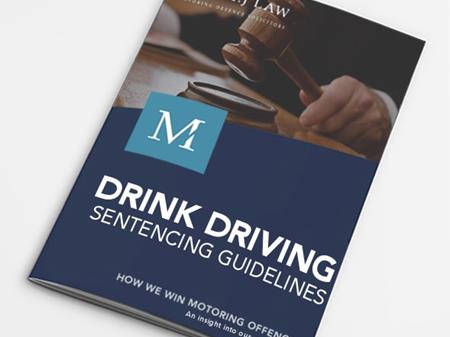Drunk in charge is an offence which you will find under section 5(1)(b) of the Road Traffic Act 1988. The charge is similar to a drink driving allegation, except the police will say that you were sat in the vehicle, or in control of the vehicle and not driving. This usually happens when the police are unable to prove that you had been driving the vehicle, so it is easier for them to charge you with an 'in charge' offence. The below blog aims to explore the defences that are available to a drunk in charge allegation.
Defending the allegation
No intention of driving
As per section 5 (2) of the Road Traffic Act 1988, it is a defence if you had no intention to drive the vehicle, whist above the legal limit for alcohol.
The burden falls on you as the defendant to demonstrate on the balance of probabilities that you had no intention of driving the vehicle and therefore, there was no likelihood that you would have driven. In order to prove that you had no intention of driving the vehicle, you could put forward evidence about your intentions that day. Evidence of this could include the following:
- Statements from friends or family members who knew your intentions that day
- Evidence from yourself at court about what your intentions were
- If you had arranged to be picked up by someone else, a statement confirming that point from that person
- Records of calls to taxi companies or a booking confirmation at the time the police came and spoke to you
It is not as simple as attending court and telling the Magistrates' or the Judge that you had no intention of driving the vehicle. You have to demonstrate that you had no intention of driving the vehicle whilst over the legal limit. This can more difficult to prove in a case that involves higher alcohol levels. Firstly, if you're under the influence of alcohol, you may well have made the decision to drive.
The Magistrates' may decide that you would have driven because you were under the influence of alcohol and you were not thinking rationally. Secondly, when you returned to the vehicle, you may still have been over the legal limit, especially when the alcohol reading is high. Expert evidence can assist in confirming your alcohol level at the time that you did intend on next driving the vehicle.
Expert evidence
An effective method of proving that you would not have been over the legal limit for alcohol is with expert evidence. We work closely with a toxicologist who regularly produces reports for us in drunk in charge cases. They would consider your height, weight and age and the alcohol level and explain when you would have dropped below the legal limit. If the expert concludes that you would have been under the legal limit before you next planned on driving the vehicle, you can run the argument at court.
Expert evidence is considered more reliable in court because it is clear, concise and impartial evidence which the court will always consider. If the expert attends your court hearing to give their evidence in person, even better.
Post-in charge consumption
It may be the case that you consumed alcohol after you left the vehicle, and before you returned. You may be able to argue that would not have been over the legal limit when you were in charge or in control of the motor vehicle.
This is known as a a post-incident consumption defence. If your breath reading is low, this argument is always considered more credible at court, because you are required to explain why you consumed alcohol after you were in control of the vehicle. If your breath reading is high, it will not prevent you from raising this as an argument. If you have expert evidence explaining that the alcohol consumed after you were in charge of the vehicle is the reason that you were over the limit, your argument is strong.
Private land argument
One other defence which you may seek to rely on when defending a drunk in charge allegation is the location of the vehicle when the police arrived. The prosecution service are required to prove that the location of the alleged offence was public. Not only are the prosecution service required to prove that the public had unrestricted access to the location or land, they are also required to prove that the public utilise the location with the permission of the land owner. If the location of the land is private, then an offence of drunk in charge cannot be committed as per the Road Traffic Act 1988.
We would be more than happy to discuss this point with you to elaborate on whether we think the land was public or private in your particular case.
Case Study - Liverpool Magistrates' Court
We recently represented a client who had been accused of being drunk in charge of a vehicle. Our client was enjoying a night out in Liverpool when he became separated from his friends. He booked an Uber using the app on his mobile phone to take him home. When the Uber failed to arrive to take him home, our client then called numerous family members to ask for a lift home. He did not get a response. The decision was made to sleep in the vehicle. Approximately 1am the next morning, the police woke him up, knocking on his window. Our client provided a roadside breath reading over the legal limit, was arrested and taken to police custody.
Once at the police station, our client gave an evidential sample of breath which produced a reading of 40 micrograms, the legal limit being 35. He was charged by the police and given a date to attend the Magistrates' Court. Our client was formally interviewed by the police before he left police custody, where he told the police that he had no intention to drive the vehicle, and he would have slept in the vehicle until 10am the following day. He also showed the police the calls he made to his family members (around 2 hours before the police actually arrived) and the booking confirmation and payment made for the taxi that did not show up. Our client then contacted us for free initial advice. We explained his options in detail and that he may have a full defence to the allegation based on the facts of his case. We then contacted the Crown Prosecution Service for the initial disclosure and advised our client what the next steps would be.
Based on the evidence provided by the CPS, we advised our client to plead not-guilty at court. We attended the initial hearing and raised the statutory defence that our client had no intention to drive the vehicle. We were then able to demonstrate using expert evidence that our client would have been under the legal limit for alcohol at the next time he drove the vehicle! As such, the court accepted that there was no likelihood of our client being over the legal limit when he next would have driven the vehicle. The court found our client not guilty of the offence. He kept his licence and avoided a criminal record.
In our most recent YouTube series, our senior solicitor Conor Johnstone explains the defences that apply to a drunk in charge allegation.
Drunk In Charge Sentencing Guidelines
| Breath | Blood | Urine | Disqualification/Points |
| 36 - 59 | 81 - 137 | 108 - 183 | 10 points |
| 60 - 89 | 138 - 206 | 184 - 274 | Consider disqualification OR 10 points |
| 90 - 119 | 207 - 275 | 275 - 366 | Consider disqualification up to 6 months OR 10 points |
| 120 - 150 > | 276 - 345 | 367 - 459 | Disqualify 6 - 12 months (extend if imposing immediate custody) |
How to avoid a conviction for drunk in charge
Defend the charge
Under Article 6 of the European Convention on Human Rights everyone has the right to a fair trial. Drunk in charge cases take place in the Magistrates' Court. You can learn the difference between the criminal courts using the GOV.UK website. The prosecution process generally begins with the police making an arrest. Evidence is then gathered by the police to establish what actually happened and who was involved. In a drunk in charge case, evidence might include;
- A breath reading
- Witness statements
- An MGDDA document
Once the appropriate evidence has been gathered, the police will decide whether it is sufficient to charge the suspect. In order to charge, the police must be satisfied that there is sufficient evidence to provide a realistic prospect of conviction against the suspect. Depending on the type and seriousness of the offence committed, this decision is made by the police or the Crown Prosecution Service (CPS). If a person is charged with drunk in charge of a vehicle, they are usually released and bailed to attend the Magistrates' Court.
Prosecutors review every case they receive from the police or other investigators. Review is a continuing process and prosecutors must take account of any change in circumstances that occurs as the case develops. This includes what becomes known of the defence case, any further reasonable lines of inquiry that should be pursued, and receipt of any unused material that may undermine the prosecution case or assist the defence case, to the extent that charges should be altered or discontinued or the prosecution should not proceed. If a case is to be stopped, care should be taken when choosing the method of termination, as this can affect the victim’s position under the Victims' Right to Review scheme. Wherever possible, prosecutors should consult the investigator when considering changing the charges or stopping the case. Prosecutors and investigators work closely together, but the final responsibility for the decision whether or not a case should go ahead rests with the CPS. [CPS Code for Crown Prosecutors]
In almost all cases involving a positive alcohol test, the police will charge the suspect. A date will then be set for the suspect to attend court for a first appearance. If you have been given a date to attend court you will no doubt be extremely worried. We have produced a detailed booklet about first hearings in the Magistrates' Court. You can access this here.
There is nothing wrong with pleading not-guilty, even if you're over the legal limit. Every person has the right to challenge an allegation made by the police and to check the evidence against them. Not only can you continue to drive for 2 - 6 months, you will also see the full case file held by the CPS, including any witness statements and the MGDDA document. It is only by checking the evidence can you find fault with it.
Thinking of pleading guilty?
Our Case Studies take a look a real cases involving real people. You may also be interested in reading about court hearings in the Magistrates' Court and Sentencing Guidelines. You can also view our case studies page for more information.

A Summary of Recent Cases – Marcus A Johnstone
How to win the 'unwinnable' cases...

Drink Driving – Your First Court Hearing
This booklet discusses a drink driving first court hearing - Is a solicitor necessary?

Will you go to prison?
This booklet looks at the Magistrates' Court Sentencing Guidelines for drink driving
Prosecution Disclosure
If you read our blogs regularly you will know that we speak often about the affect of prosecution disclosure (or lack of) in criminal cases. Under the Criminal Procedure and Investigations Act 1988 the CPS have a duty to provide you with;
- The evidence is wants to use against you
- A schedule of unused material
This disclosure should be served as soon as possible following a not guilty plea in the Magistrates' Court and usually within 28 days of the first hearing. But what happens if the CPS fail to provide disclosure within the permitted timeframe?
A failure by the CPS to provide disclosure is one of the most common ways that we win drunk in charge cases. This is because rules of evidence require the CPS to serve its evidence prior to trial. Often due to staff shortages and administration problems the CPS miss deadlines and make silly mistakes. This is a common occurrence in Magistrates' Court cases, usually because drunk in charge cases are less serious than other offences in higher courts.
Unfortunately it's not as simple as sitting back and letting the CPS slip up. The defence are required to be proactive in contacting the CPS and in some circumstances are required to call the case back to court for a pretrial review. As an experienced team of specialist defence solicitors, we can advise you on all of these issues. We know how to best safeguard your position in order to give you the best chance of winning your drink driving case.
Next Steps: Please get in touch to discuss your case with a member of our team. You can use the contact form below or call 01514228020 for free initial advice. You can also use our drink driving ban calculator or check out our video series.



